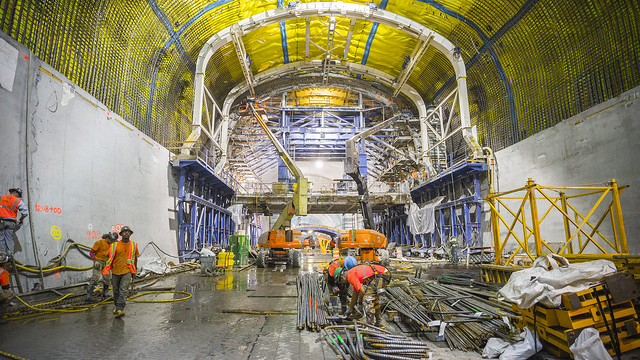Over the last few weeks, the MTA’s proposed $32 billion capital plan has faced criticism from just about everywhere. Staten Islanders are not happy with it; the state’s Capital Program Review Board flat-out rejected it; and State Comptroller Tom DiNapoli is concerned about the ever-ticking debt bomb. Now we can add the influential Citizens Budget Commission to the list.
In a Policy Brief released yesterday (pdf), the CBC does not pull it punches. Citing “misplaced priorities,” the CBC calls the plan “misguided” and says that riders should not be asked to pay for a plan that doesn’t spend money on the right things. Essentially, the charge amounts to one of recklessness — the MTA has asked for an incredibly high sum of money without making the right case for the expenditures.
“The MTA is a core asset of the New York region’s economy, and funding its capital needs wisely should be a high priority,” CBC President Carol Kellermann said in a statement. “The public debate over the proposed MTA capital plan should focus on what the funds would achieve as well as how much funding is needed.”
The CBC’s critique can be boiled down to three salient points. First, the report alleges that the MTA is not making sufficient progress in achieving a state of good repair for aging and aged infrastructure. “Most of the facilities,” the CBC noted in a refrain we’ve heard before, “are not in a state of good repair.” To make matters worse — or at least, not better — the next five year plan will not close the gap and will, says the CBC, “leave many features of the mass transit and commuter rail systems, such as stations and less visible power stations and pumps, in need of repairs and renovations; the consequence will be less reliable and less safe service than the public needs.”
Second, the CBC is not impressed with the MTA’s plans to modernize the subway’s signal and communications systems. This should be a clear priority at this point as it’s one of the few ways, absent massive capital construction projects, that the MTA can expand service on preexisting subway lines, but it’s a tough sell politically as you can’t have a ribbon-cutting for some new signal system or CBTC. The CBC summarizes: “In the next five years work will begin on only two additional segments, leaving the vast majority of the system with outdated components for at least the next 20 years.”
Third, and perhaps most importantly, the CBC alleges that the MTA hasn’t properly made its case to the public. “The proposed plan allocates substantial sums, and implicitly commits even larger sums in the future, to new projects that expand the transit network without analyzing their benefits relative to other possibilities and without identifying their total cost.” In turn, the CBC states that the MTA does not have clear priorities in selecting projects and a “weak capacity” for implementing projects efficiently (which is probably being nice about it). The CBC wants to see explicit criteria for priority projects and evidence of long-term investments before anyone forks over money.
That final point is a key one as the MTA’s five-year plan includes requests for $1.5 billion for the second phase of the Second Ave. Subway and significant spends for the Penn Station and East Side Access projects. The Second Ave. Subway, in particular, has been problematic as the MTA has refused to release a full cost estimate for Phase 2. When the MTA first proposed the four-phase approach over ten years ago, Phase 2 was expected to cost approximately as much as Phase 1, but the MTA must refresh the EIS and engineering reports. Thus, the agency does not wish to give a final cost yet but insists that it needs the $1.5 billion to begin planning now and construction toward the end of the five-year plan. It’s a weird Catch-22 of this half-decade funding process but one that bears a closer look.
So here we are. No one seems to like the MTA’s capital plan, but it needs to happen in some form or another. How we get there remains to be seen, but it seems clear that the MTA should answer to these complaints once (if? whenever?) everyone in Albany gets serious about the next round of funding and spending plans.

 As the MTA gears up for a full-court press in Albany and City Hall concerning
As the MTA gears up for a full-court press in Albany and City Hall concerning  Update (4:00 p.m.): The full proposal for the MTA’s 2015-2019 Capital Plan has been
Update (4:00 p.m.): The full proposal for the MTA’s 2015-2019 Capital Plan has been 
 OK, OK. Maybe there’s no Jeffrey Lebowski to ask for money, but New York State Comptroller Thomas DiNapoli can’t seem to find around $12 billion for the MTA’s next capital plan. This is hardly a breaking piece of news for anyone who’s watched the recent politicking behind the MTA’s looming need to present a new five-year spending plan, but DiNapoli’s
OK, OK. Maybe there’s no Jeffrey Lebowski to ask for money, but New York State Comptroller Thomas DiNapoli can’t seem to find around $12 billion for the MTA’s next capital plan. This is hardly a breaking piece of news for anyone who’s watched the recent politicking behind the MTA’s looming need to present a new five-year spending plan, but DiNapoli’s